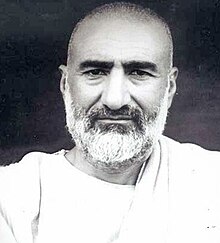Ghaffar Khan
|
Abdul Ghaffar Khan Bacha Khan |
|
|---|---|

Bacha Khan pictured in the 1940s
|
|
| Born |
6 February 1890 Utmanzai, Hashtnagar, Frontier Tribal Areas of Punjab Province, British India (in present-day Charsadda District, Khyber Pakhtunkhwa, Pakistan) |
| Died | 20 January 1988 (aged 97) Peshawar, Khyber Pakhtunkhwa, Pakistan |
| Resting place | Jalalabad, Nangarhar, Afghanistan |
| Nationality | British India – (1890–1947) Pakistan - (1947-1988) |
| Organization |
Khudai Khidmatgar Indian National Congress Pakistan Socialist Party National Awami Party |
| Movement | Khudai Khidmatgar, Indian Independence Movement |
| Spouse(s) |
Meharqanda Kinankhel (m. 1912–18) Nambata Kinankhel (m. 1920–26) |
| Children |
Abdul Ghani Khan Abdul Wali Khan Sardaro Mehar Taja Abdul Ali Khan |
| Parent(s) | Bahram Khan |
| Awards |
Amnesty International Prisoner of Conscience of the Year (1962) Jawaharlal Nehru Award for International Understanding (1967) Bharat Ratna (1987) |
Abdul Ghaffār Khān' (6 February 1890 – 20 January 1988) (Pashto: خان عبدالغفار خان), nicknamed Bāchā Khān (Pashto: باچا خان, lit. "king of chiefs") or Pāchā Khān (پاچا خان), was a Pashtun independence activist against the rule of the British Raj. He was a political and spiritual leader known for his nonviolent opposition, and a lifelong pacifist and devout Muslim. A close friend of Mohandas Gandhi, Bacha Khan was nicknamed the "Frontier Gandhi" in British India. Bacha Khan founded the Khudai Khidmatgar ("Servants of God") movement in 1929, whose success triggered a harsh crackdown by the British Empire against him and his supporters, and they suffered some of the most severe repression of the Indian independence movement.
Badshah Khan strongly opposed the All-India Muslim League's demand for the partition of India. When the Indian National Congress declared its acceptance of the partition plan without consulting the Khudai Khidmatgar leaders, he felt very sad and told the Congress "you have thrown us to the wolves." After partition, Badshah Khan pledged allegiance to Pakistan and demanded an autonomous "Pashtunistan" administrative unit within the country, but he was frequently arrested by the Pakistani government between 1948 and 1954. In 1956, he was again arrested for his opposition to the One Unit program, under which the government announced to merge the former provinces of West Punjab, Sindh, North-West Frontier Province, Chief Commissioner's Province of Balochistan, and Baluchistan States Union into one single polity of West Pakistan. Badshah Khan also spent much of the 1960s and 1970s either in jail or in exile. Upon his death in 1988 in Peshawar under house arrest, following his will, he was buried at his house in Jalalabad, Afghanistan. Tens of thousands of mourners attended his funeral, marching through the Khyber Pass from Peshawar to Jalalabad, although it was marred by two bomb explosions killing 15 people. Despite the heavy fighting at the time, both sides of the Soviet war in Afghanistan, the communist army and the mujahideen, declared a ceasefire to allow his burial.
...
Wikipedia
